For years Aberdeen was a boomtown which boasted the highest concentration of millionaires in Britain, one of the lowest rates of unemployment and gave thousands the opportunity to make their fortune as the North Sea oil flowed.
High class hotels, bars and restaurants sprang up to service the burgeoning number of highly paid offshore workers and allow them to let off steam and empty their bulging wallets on their shore leave.
Alex Ferguson‘s Aberdeen FC were crowned the kings of Europe twice, beating Real Madrid to win the European Cup Winners Cup in May 1983 and the European Super Cup seven months later.
The Scottish National Party even notoriously claimed that the huge tax revenues from North Sea oil and gas could bankroll an independent Scotland to become a sovereign European nation in their quit-the-union literature.
But Westminster’s growing obsession with net zero environmental policies culminated in Labour’s refusal to allow new drilling in the North Sea which dealt a body blow to a city already reeling from the 2014 slump in the oil price.
Around 180 of the UK’s 280 current oil and gas fields are expected to shut over the next five years and new fossil fuel production licences were banned last year by Energy Secretary Ed Miliband.
And there are projections that as many as 200,000 well-paid jobs could soon disappear.
The consequences of this in Aberdeen are impossible to miss – the granite city is declining as quickly as a generation ago it boomed.
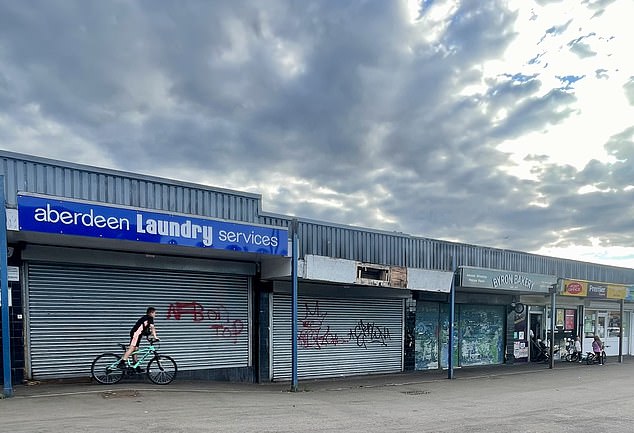
For years Aberdeen, pictured, was a boomtown which boasted the highest concentration of millionaires in Britain but net zero environmental policies have hit the area hard
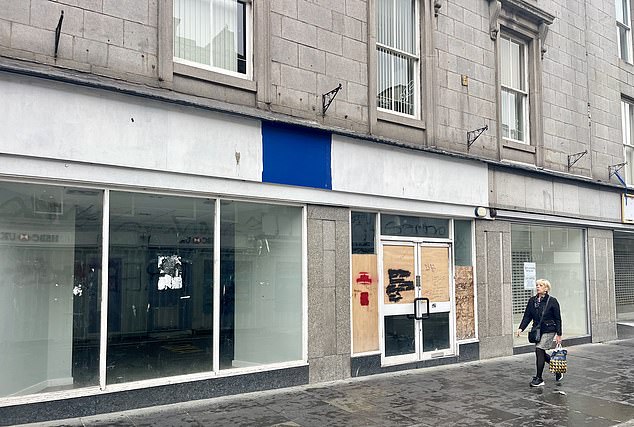
Labour’s refusal to allow new drilling in the North Sea dealt a body blow to a city already reeling from the 2014 slump in the oil price
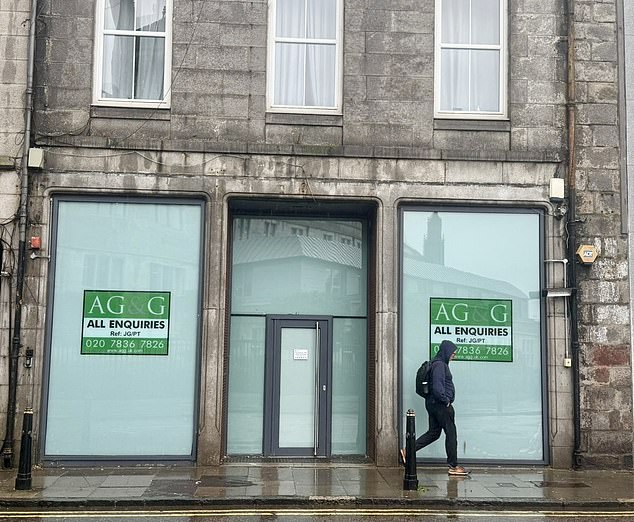
Shops pictured boarded up in Aberdeen. There are projections that as many as 200,000 well-paid jobs could soon disappear
Property prices have sunk to 2007 levels, top name stores John Lewis, Debenhams and Marks and Spencer have closed and been replaced with vape and charity shops.
Beggars are a routine sight around the city centre, bored out of work youngsters roam around drab housing estates and struggling families queue for hand-outs at foodbanks.
Shell’s imposing brutalist headquarters that once looked out over Aberdeen’s commercial port, is now a pile of dust and stones – demolished.
And Doonies Rare Breeds Farm, a popular family attraction on the outskirts of the city, was closed down despite huge local opposition, to make way for an ‘Energy Transition Zone’.
As one former oil rig engineer explained bluntly: ‘Aberdeen has gone to sh***.
‘This city was once the richest in Scotland and among the richest in the world. Now it’s in a mess.’
Meanwhile across the waves, Norway made one of the biggest North Sea oil discoveries in a decade last month in an area that was thought to have been fully explored and is geologically similar to the UK sector.
In a speech in Aberdeen this week Conservative Party leader Kemi Badenoch warned that ‘200,000 jobs across the [oil] sector are in danger’ and she urged the government to make use of the ‘7.5 billion barrels [of North Sea oil] that could still be produced from our waters’.
She said: ‘Labour sees the North Sea as a relic of the past; we see it as a cornerstone of Britain’s future. By restoring common sense to energy policy, we will unlock billions in revenue, secure our supply and rebuild confidence in the UK economy.
‘I am proposing a new future for the North Sea, one that puts Britain back in control of our own energy destiny. The North Sea is not a wasteland, it’s a cornerstone of Britain’s future.’
She said in contrast to Labour Energy Secretary Ed Miliband ‘strangling the North Sea in his dogmatic and ideological pursuit of net zero’ the Conservatives ‘are focused on securing jobs, investment, and energy independence’.
Scottish Conservative leader Russell Findlay added: ‘I’ve seen the harmful impact of the SNP and Labour’s anti-oil and gas agenda.
‘Only the Scottish Conservatives are standing up for the people of the North East [of Scotland] and the thousands of livelihoods that depend on oil and gas.’
While Badenock promises to bring prosperity back to Britain’s ailing North Sea oil and gas industry, the hard truth about Aberdeen’s slide from boom to bust can be revealed.
![In a speech in Aberdeen this week Conservative Party leader Kemi Badenoch, pictured in Aberdeen on Tuesday, warned that '200,000 jobs across the [oil] sector are in danger'](https://www.americanpolibeat.com/wp-content/uploads/2025/09/1757248698_691_Boomtown-to-doom-town-Labours-green-energy-net-zero-obsession.jpg)
In a speech in Aberdeen this week Conservative Party leader Kemi Badenoch, pictured in Aberdeen on Tuesday, warned that ‘200,000 jobs across the [oil] sector are in danger’
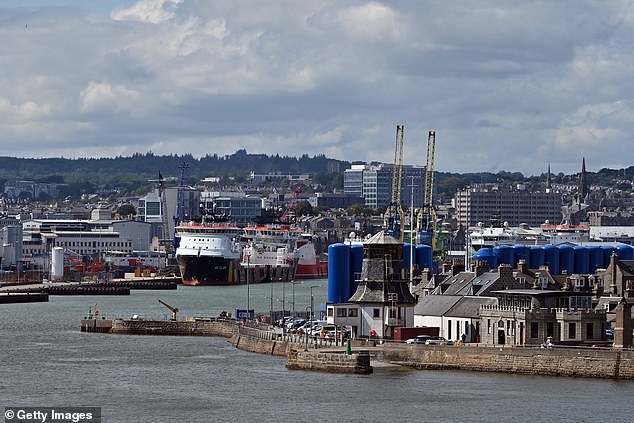
Even before the hundreds of thousands of expected job losses, unemployment is currently higher than the Scottish average, standing at 4.3 per cent (pictured: the main harbout)
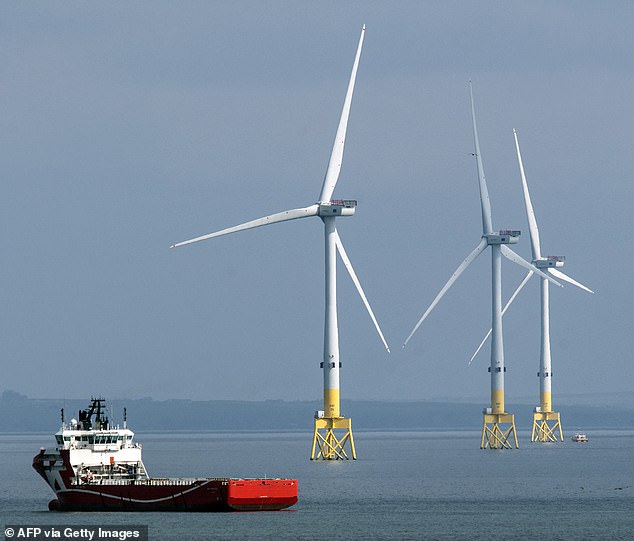
Around 180 of the UK’s 280 current oil and gas fields are expected to shut over the next five years (pictured: wind turbines off the coast of Aberdeen)


Clifford Holland, pictured left, said a return to mass drilling for oil would ‘improve Aberdeen’s local economy’ while Maureen Holland, right, said the areas was bustling back in the 1980s
At the Lord Byron pub in the working-class district of Northfields, former oil-rig workers Mac and Bert discuss the demise of the British oil industry and the downfall of Aberdeen.
Retired pump engineer Mac, 70, said: ‘I worked offshore for more than 40 years in the North Sea and in other parts of the world. And to be honest the oil industry in Scotland has all gone to sh*** – and that happened a long time ago.
‘I worked for Shell at [the] Brent Charlie [fixed platform]. The food was good, the accommodation was good, and the money was good.
‘But in the 90’s we started getting pay cuts. That’s when it started going wrong.’
Retired lift inspector Bert claimed that the cut in pay ruined the industry.
Bert, 65, said: ‘I worked offshore as a lifting inspector. To be honest I miss it, despite the weather and the rough conditions.
‘But now the lads working out there are earning half of what we were earning back in the 80’s.’
A short walk from the Lord Byron, past boarded up shops and fast-food take-aways, the Northfield Community Centre runs a food bank – one of 25 emergency food collection points across the city.
Just off Union Street, the main shopping street, Aberdeen Cyrenians open their doors of their food bank discreetly from 10am to the desperate.
And in the suburb of Bachsburn, foodbank volunteers have explained how 35 local families depend on their support.
Henny Harding, 70, said: ‘Aberdeen has certainly got a lot poorer. When I arrived here in 2012, if you put your house for sale on a Friday, it would be sold by Wednesday. Now houses go for months and months without being sold.’
She added: ‘We’ve lost all the big stores – John Lewis and Debenhams have gone and we’ve lost one M&S.
‘Union Street is now full of vaping and charity shops. It’s not what it used to be.’
Two months ago, BrewDog announced it was closing its flagship pub in Aberdeen. The Granite City venue was the first ever BrewDog to be opened by Aberdonian entrepreneur James Watt in 2010. But the firm announced in July that the bar was no longer ‘economically viable’.
The closure is the latest top name firm to retreat from Aberdeen.
John Lewis closed permanently in August 2021, Debenhams closed in December 2020 and Marks and Spencer’s once thriving store on St Nicholas Street closed after 81 years in May this year.
The Beach Leisure Centre, that was opened in 1989 at the height of the oil boom, was closed in 2023 by the council who blamed increased energy costs.
Maybe this was another reason why Aberdeen was voted Britain’s third most depressing city last year.
However, residents have called for a return of the oil boom days.
Former oil worker Clifford Holland, 75, said: ‘I used to work for Shell. Its old premises have been demolished which is symbolic of the industry’s decline and the impact it’s had on the city.
‘Green energy is okay but there’s still room for drilling for oil. Just ask Trump across the Atlantic, he doesn’t like windmills. A return to mass drilling for oil would definitely improve Aberdeen’s local economy.’
His wife Maureen Holland, 75, added: ‘I was here in the 1980s and Union Street would be bustling. Plenty of shops and no empty or boarded up units like today. There’s nothing here at all now.
‘It’s hard to see Aberdeen ever returning to what it once was. An upsurge in the local oil industry would certainly be a good start.’
Lorraine Thain, 73, said: ‘The decline in the oil industry has absolutely had a negative impact on the city. The oil brought in so much business and people with deep pockets willing to spend cash locally. Now there’s none of that and it’s just sad to see.’
Karen Shepherd, 54, added: ‘I remember the 1980s and the oil boom well. Everyday was buzzing in the city centre.
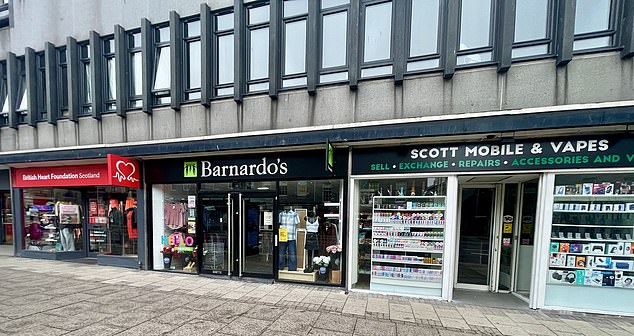
Top name stores John Lewis, Debenhams and Marks and Spencer have closed and been replaced with vape and charity shops
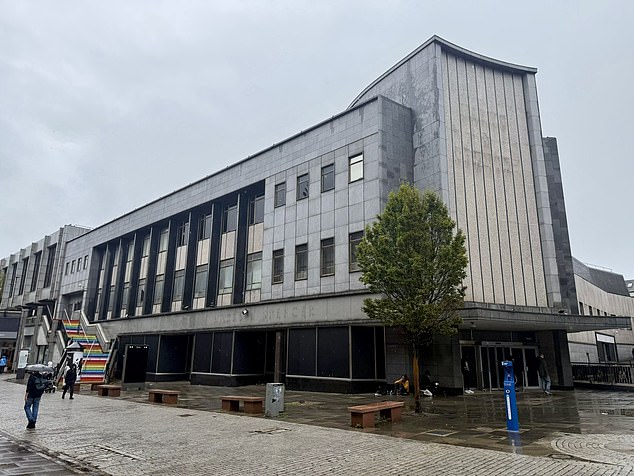
The former Marks and Spencer on St Nicholas Street in Aberdeen. The once thriving store closed after 81 years in May this year

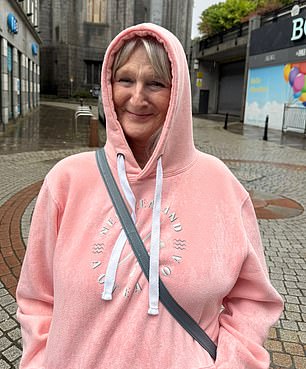
Karen Shepherd, pictured left, said ‘everyday was buzzing in the city centre’ during the 80’s oil boom while Lorraine Thain, right, said the decline in the oil industry has had a negative impact
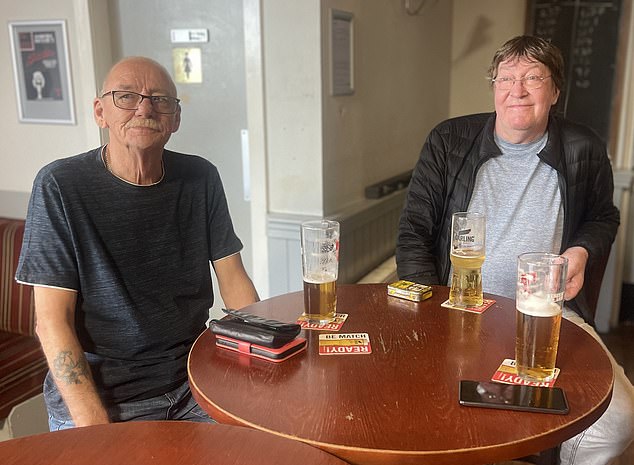
Former oil rig workers Mac and Bert said the oil industry in Scotland has all gone to sh*** – and that happened a long time ago
‘Everything was a lot better back then. If they started new drilling again it could improve things. The city has steadily gone downhill over the years.’
Even before the hundreds of thousands of expected job losses, unemployment in Aberdeen is currently higher than the Scottish average, standing at 4.3 per cent.
However poignantly more than one in five people in Aberdeen [21.6 per cent] of working age [16 to 64] have given up working or looking for working, rendering some 39,500 ‘economically inactive’.
Meanwhile the Justice Mill Wetherspoon’s pub on Union Street is already half full by 10.30am, with many punters tucking into a Scottish breakfast for less than a fiver, often accompanied a pint of Tennant’s. Others simply sit alone with a glass of lager.
The value of property in Aberdeen has been another victim of the city’s downfall.
During the North Sea oil boom, house prices peaked in 2014, before plunging with the slump in the oil price.
The average house price in Aberdeen was £142,000 in June this year, according to the Office of National Statistics, similar to the average cost of property in 2007. At their peak in 2014 the average house in the city cost £212,000.
Aberdeen’s respected Press and Journal newspaper reported: ‘Properties peaked in Aberdeen before the impact of the oil price slump, which began in 2014, took hold.
‘This means the average price in Aberdeen is currently at the same level as it was in May 2007.’












